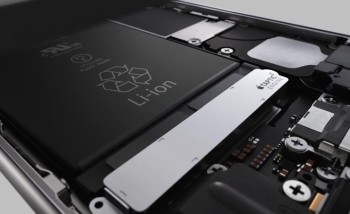Forcing a slowdown on older iPhones increases the chances of passing legislation on the right to repair
 Two days ago, Apple admitted the presence of an undocumented function in iOS, which reduces the processor's clock speed if an old battery is installed in the smartphone. This behavior of the operating system found users Reddit . When the information spread on social networks, the "apple company" had to give an explanation. It must be admitted, it looks quite plausible.
Two days ago, Apple admitted the presence of an undocumented function in iOS, which reduces the processor's clock speed if an old battery is installed in the smartphone. This behavior of the operating system found users Reddit . When the information spread on social networks, the "apple company" had to give an explanation. It must be admitted, it looks quite plausible.
Apple explained that slowing down old smartphones is not at all for the purposes of planned obsolescence, as one might think. It turns out that this is done in order to avoid inadvertently turning off the smartphone in the cold. It takes into account not only the charge / voltage of the battery, but also the ambient temperature. The colder, the more Apple slows the iPhone. The algorithm for slowing down the processor began to work with the iOS 10.2.1 update, released in January 2017.
It would seem that Apple thought about users and introduced them to a useful function. One can only welcome a similar initiative of a caring company. In fact, the phone knows best how fast it should work. However, not all users have shown joy about this. Six people even sued .
Owners of independent repair shops said in an interview with Motherboard that they have already noticed an increased activity of iPhone owners who are asking to replace the battery. Replacing the battery beyond the warranty period in the US, Apple will cost $ 79. Moreover, the battery is changed only if the phone does not pass a proprietary diagnostic test . Otherwise replacement is prohibited.
Not everyone will be able to replace the battery on its own, because it is firmly glued to the case - a set of special tools is required to open the case and tear off the battery. You can not melt the glue, because next to the battery, which is dangerous to heat. But there are solutions that dissolve Apple branded glue. Although the company and hid its composition, but the repairmen figured out. Naturally, in such conditions, users turn to independent service workshops, where the replacement costs about $ 40.
There was a situation when users of Apple products again became powerless hostages of the manufacturer, who manipulates their smartphones without asking the owners for approval. Apple’s secrecy could be a trump card in the hands of activists who are struggling to enact laws about the “right to repair . ” The 2018th year should be decisive in the struggle of these activists with a powerful lobby of officials who receive money from Apple for blocking these bills in the framework of the officially approved lobbying procedure in the USA.
In 2017, 12 states promulgated the right to repair , but due to lobbying, not one passed. In early 2018, a new attempt will be made in many states. The forced slowdown of smartphones by Apple came in handy. It can help push through the law, at least in several states.
The draft laws on the “right to repair” propose amendments to the current legislation regarding the sale of electronic equipment. The amendments simplify the repair of equipment in third-party workshops: the manufacturer is obliged to provide all the necessary documentation for such repairs in independent workshops, as well as provide independent repair shops and individuals with the same software tools and software updates needed for repairs that the manufacturer provides to its select partners.
The current scramble with the forced slowdown of the iPhone once again confirms the point of view of activists from the Repair.org organization, who accuse Apple of planned equipment obsolescence: “If Apple really cared about battery life, it would encourage battery replacement,” says Gay Gordon-Byrne ( Gay Gordon-Byrne), executive director of Repair.org. “Apple clearly gains greater financial benefit when people decide that their phones are too slow and are sent to the Apple Store to buy a new phone.”
The Repair.org organization unites the interests of third-party independent workshops that are engaged in, among other things, the repair of Apple technology.
In fact, Apple has never called on users to change batteries after 1.5-2 years of use, although this is the most reasonable and natural behavior on the part of the owner of an old smartphone. It’s probably really beneficial for the company to have the user buy a new model and throw the old one away or give it back to the novice Apple user. Especially since the new model release cycle just provides that the new model enters the market exactly when the battery starts to sit down on the old model, and now the processor is also slowing down. Everything seems to be accidentally forming in favor of buying a new model.
This story should be a good example in explaining to users why the work of independent repair shops for branded equipment is so important, even if the company itself is against.
All Articles